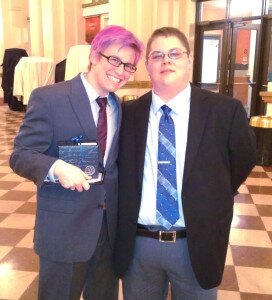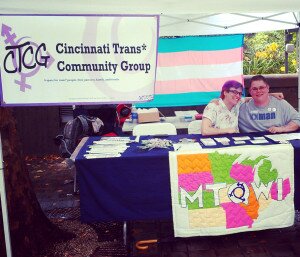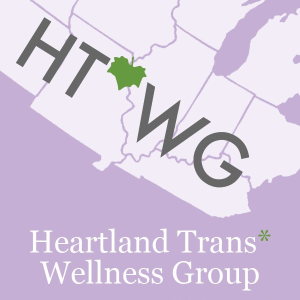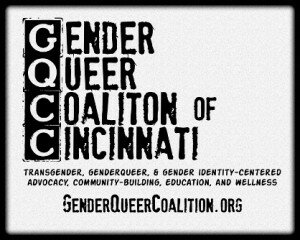
GenderQueer Coalition ad from a conference booklet, 2008
Heartland Trans Wellness Group originated, at very first, in 2007 as a small grassroots trans resource project called The GenderQueer Coalition. The GenderQueer Coalition, created and lead by JAC Stringer in Cincinnati, Ohio, was initially designed to be a radically organized community based resource hub for trans people, their partners, and family members in the Cincinnati area. Over the next year, Stringerbegan to travel through nearby areas of the Midwest to evaluate local resources that could both support and be supported by The GenderQueer Coalition. Stringer found that the impacts of trans isolation and the lack of resources were so severe that he shifted his organizational goal to address needs in all twelve Midwestern states (Illinois, Indiana, Iowa, Kansas, Michigan, Minnesota, Missouri, Nebraska, North Dakota, Ohio, South Dakota, and Wisconsin) with the addition of Northern Kentucky because of its proximity to Stringer’s location. The goals for the project included using radical deconstructionism to provide trans community spaces for trans people and their adjacent communities of partners and family members, to promote socially just trans and queer education resources, and address gender pathologization for better, more accessible health and wellness resources.
In its early days, the project was primarily an online resource offering educational information, community support resources, and a small, but growing database of Midwestern trans health and wellness providers. Stringer provided support to Midwestern trans people over email and, when able, traveled to provide educational lectures, organizational support for small trans grass root projects, and to create “pop-up” safer spaces and discussion groups for several populations including trans adults and youth, survivors, sex workers, partners of trans people, and activists. By 2010, Stringer sought to expand the project’s reach and renamed the it, “The Midwest Trans and Queer Wellness Initiative (MTQWI).” The name change was significant because it signified an intermediate phase of growth, ideally resulting in the founding of a formalized non-profit. In addition to a change in name, the goals of the project were expanded with a greater focus on direct service/community programs and healthcare advocacy. The primary goals of MTQWI were to use socially just radical organizing methods to foster affirming, accessible trans and LGBQPIA community spaces, promote access to and practice of non-pathologizing trans centered health and wellness care, and develop a network of organizations to support creation of multiple Midwestern LGBTQPIA health clinics and organizations centered on social justice and intersectionality. An additional goal Stringer held in view was to inundate social justice values into urban, rural, and isolated trans (or otherwise LGBQPIA) communities which, he believed, might help make community spaces more accessible and affirming for the increasing number of trans and queer youth whose language and identities may not align with more historical trans community dynamics.
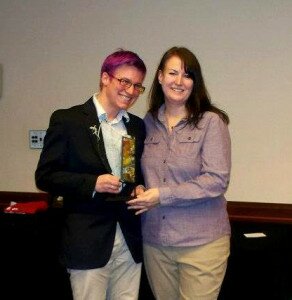
JAC Stringer accepting Joe Norton Award, 2013
In 2011, MTQWI saw significant changes from obtaining a phone number, (and with that, the first calls to the new help/resource line), to the development of its first regularized program. After several years of providing sporadic support gatherings in his home, Stringer developed a non-traditional group model centered on trans community building and public community integration. The program, called Cincinnati Trans* Community Group (CTCG), held its first meeting on July 27, 2011 and by October was holding a variety of monthly meetings with closed spaces for trans people, partners, and an integrated space for all members of the greater trans community. The year 2012 marked the growth of several significant partnerships with local Cincinnati organizations including Caracole House, Pones Inc., Planned Parenthood, Crossport, and the Cincinnati Police Department. The help line increased in the number of calls and the trans-friendly provider database expanded significantly. Cincinnati Trans Community Group doubled in size and activity from summer 2011 to summer 2012 and by 2013 it was noted to be one of the most active trans community programs in the country.
In the early winter of 2013, MTWQI took on its first intern, a then nursing student, Jonah Yokoyama. In March 2013, MTWQI’s Director, Stringer, accepted the American Counseling Association’s Joe Norton Award in recognition of MTQWI’s work for the greater trans community in the Midwestern states. In the summer of 2013, Jonah Yokoyama joined on as a staff organizer taking the initiative’s (volunteer) staff from one, to two. Stringer and Yokoyama worked to develop resources to increase provider trans competency and solidified goals to increase trans people’s access to health and wellness care. Yokoyama began providing health education services to trans community members including helping people better understand their transitional care and how to obtain better service from their providers. Stringer and Yokoyama gathered a small team to assist in growing the initiative to where it could become a non-profit.
In September 2013, the Midwest Trans and Queer Wellness Initiative formally transformed into Heartland Trans* Wellness Group. The organization kept the goals of the initiative from which it was board, with an added sense of urgency to address the growing need of the trans community. By that time in 2013, Cincinnati Trans* Community Group was so large it had outgrown two different housing spaces from which developed a passionate collaboration with the Cincinnati organization, Happen Inc. The rest of 2013 was spent developing a board, obtaining the organization’s first ever office space, identifying priorities for incorporation, and addressing the ever increasing requests from the local and regional trans communities. Heartland then had a staff of three people; a full time Director of Admin and Programming (Stringer, founder), a Transitional Health Care Director (Yokoyama), and a Contemplative Services and Communications Director (Anonymous). That November, Heartland produced Cincinnati’s the first Trans Day of Remembrance (TDOR) event to be held in downtown Cincinnati. Also the city’s first secular, open-aired TDOR, which was documented to be the largest LGBTQPIA community event held in the city which was not a fundraiser, a conference, in a bar, or related to Pride. Heartlands programs and resources continued to grow, seeing a major increase in community participation in services and programs as well as an increase of provider education requests and community partner collaborations. By 2014, Heartland had grown greatly in size and work, providing educational lectures, community programs, consultations, and organizational support to non-profits and community lead grass root initiatives. Heartland began to obtain small grants from community funders like the Trans Justice Funding Project and local donors and by 2015 Heartland was able to launch a small Binder-Share project to support local trans people in accessing safer binding methods. Also in 2015, Heartland officially obtained status as a 501c3 tax exempt organization and began seeking options for greater funding as well as a physical space for programs and services.
In the fall of 2014, Stringer presented an evaluation of Heartland’s services to the organization’s Board, suggesting a refinement of the mission with greater direction towards healthcare advocacy, as it had organically become Heartland’s primary form of service. Also in his evaluation, Stringer suggested appointing a health professional as Director, asking if Yokoyama had interest in succeeding him in the position. Then Stringer and Yokoyama transitioned leadership over the course of the year; on June 26th, 2015 Stringer officially retired and Yokoyama took the role of Heartland’s second Director.
Heartland Trans* Wellness Group continues to grow and strive to serve the Midwest’s greater trans community of trans people, their partners, families, and friends. The organization’s work continues to be recognized locally and nationally, and the organizers, past and present, are all anxious to provide more services and resources to the community.

